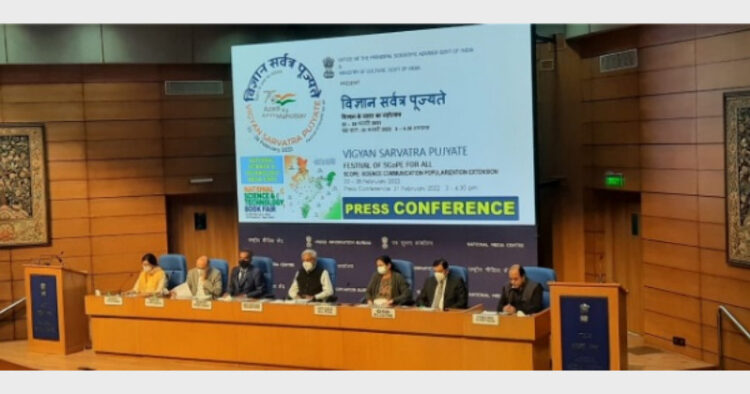The programmes have been grouped under four themes and have been designed to inspire India’s youth and help them navigate into building a progressive nation
New Delhi, February 21: A weeklong festival to highlight the country’s achievements in various fields of science is all set to begin across the country on Tuesday as part of the Government of India’s year-long programme Azadi ka Amrit Mahotsav.
The commemoration titled Vigyan Sarvatra Pujyate will be held simultaneously in 75 locations across the length and breadth of the country from Leh and Srinagar in the north to Port Blair and Kavaratti Islands, Lakshadweep in the south, from Ahmedabad and Daman in the west to Itanagar, Kohima, and Aizawl in the east, apart from the national capital of Delhi. Like a feather in the cap, a science & technology mega expo along with a national science book fair are also being held in New Delhi’s Jawaharlal Nehru Stadium.
The event is being jointly organised by the Department of Science and Technology, Department of Biotechnology, Council of Scientific and Industrial Research, Ministry of Earth Sciences, Department of Atomic Energy, Department of Space, Indian Council of Medical Research, All India Council for Technical Education, and Defence Research Development Organisation, under the leadership of the office of the Principal Scientific Adviser to the Government of India and the Ministry of Culture. Vigyan Prasar, an autonomous organisation of DST with a mandate to promote science communication in the country, is the coordinating agency.
Announcing the programme at a press conference on Monday, Dr K Vijay Raghavan, Principal Scientific Adviser to Government of India, said it has been designed to inspire India’s youth and help them navigate into building a progressive nation; bring to the fore stories of people in science who made these achievements possible; reinforce the commitment of the scientific community towards the economic and social development of the country; present the awe-inspiring futuristic mega-science projects embarked by the nation and highlight the work being done by R&D organisations from across the country. The event would display the country’s scientific legacy and technology prowess that has helped find solutions to defence, space, health, agriculture, astronomy, and other sectors.
The programmes have been grouped under four themes. The first theme is `from the annals of the history of S&T’. This section traces the contributions of founders of modern science and institutions of national importance to nation-building. It will be done in the form of the screening of 75 films on 75 scientists and 75 lectures by eminent scientists and technocrats across the 75 locations.
The programmes under the second theme, ‘Milestones of Modern S&T’, will highlight critical discoveries, innovations, or inventions that made a mark in global science and India’s development story.
The third theme, `Swadeshi Paramparik Inventions and Innovations’, will showcase 75 inventions or technologies that made India self-standing and helped in achieving the goal of self-reliance by drawing upon the reservoir of traditional knowledge systems, such as drugs from herbs.
The fourth theme, `transforming India’, will look at the road ahead for the next 25 years of Indian S&T. It would include talks by 75 eminent scientists & technocrats from within India and the diaspora on their ideas for Indian S&T as it marches towards the centenary year of India’s independence.
Mr Ratnesh Jha, Officer on Special Duty in the Ministry of Culture, Dr (Mrs) Parvinder Maini, Scientific Secretary, Office of the PSA, Dr S Chandrasekhar, Secretary, Department of Science & Technology, Dr Rajesh S Gokhale, Secretary, Department of Biotechnology, and Dr Nakul Parashar, Director, Vigyan Prasar, briefed on the details of the programme.
‘Vigyan Sarvatra Pujyate’ would include a science literature festival that will bring together science writers, communicators, artists, poets, dramatists, street play artists, hands-on science demonstrators, journalists, students, and teachers. Besides, several competitions, including quiz programmes, essays, posters, and poetry contests, are being held to promote scientific temper, particularly among the youth.
Different science activities will be organised at all 75 locations. The open-ended, hands-on activities are aimed at motivating young learners to appreciate the joy of science learning by doing it. Through these participatory opportunities, jan bhagidari in the celebrations would be nurtured.
The programme will be held in various Indian languages, including Kashmiri, Dogri, Punjabi, Gujarati, Marathi, Kannada, Malayalam, Tamil, Telugu, Odia, Bengali, Assamese, Nepali, Maithili, and Manipur and will include the screening of 75 films.
The inaugural programme will be held at Vigyan Bhavan, New Delhi, on February 22 at 3 PM and will be telecast live at all the 75 locations across the country where the festival is being organised. Union Minister of Tourism, Culture and Development of North-Eastern Region of India, G. Kishan Reddy, and Union Minister of State (Independent Charge) Science & Technology; Minister of State (Independent Charge) Earth Sciences; MoS PMO, Personnel, Public Grievances, Pensions, Atomic Energy and Space, Dr Jitendra Singh will inaugurate the programme.
The programme will end on February 28 with a grand valedictory function. It will coincide with the National Science Day, celebrated on February 28 every year since 1987, in remembrance of Nobel Laureate Sir C.V. Raman’s path-breaking discovery of the Raman Effect in 1930. National Science Communication Awards and prizes to the winners of various contests held as part of the Mahotsav would be presented on the occasion. The entire event, including the main inaugural and valedictory functions at Delhi, will be live-streamed across 75 places. All events would be organised mindful of the relevant and required COVID protocols and adhere to the directives of appropriate agencies. (India Science Wire)













Comments